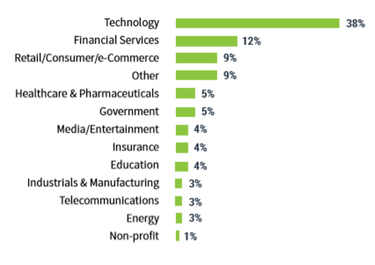|
With ever-changing consumer preferences, direct-to-consumer sales are trending. E-commerce is possessing a significant threat to traditional brick and mortar stores. In recent years, many retailers started building their digital retail platforms but often ended up short compared to e-commerce companies. Retailers are falling back in digital space because of their traditional business practices, operational models and lack of digital capabilities. Many retailers have struggled to adopt technology innovations moving to cloud-based or SaaS solutions for day-to-day operations. The critical challenge of embracing new technologies is that doing so can be long, difficult and frightening, particularly when these changes force you to reconsider ways of doing things. However, retailers are conscious that switching to digital gives them greater agility and multiplies the business growth. All these factors lead to the need for Digital Transformation in the retail industry. Retail Industry: The Era of Digital Transformation Digital transformation provides the retailers to open-up an omnichannel and multi-channel experience for their consumers. Digital presence gives the customers ease to shop across various platforms according to their convenience. Customers frequently expect new features and experiences. These frequent updates must be rolled out in such a way that it provides agility and consistency without compromising on the stability. This is critical to creating a seamless, unified experience across physical and digital channels. To serve millions of users, we need reliable infrastructure to ensure a network that is readily accessible and stable. The setup includes setting up backup systems, network configurations, development of applications, internal departments developing, testing, monitoring and implementing procedures, and more to facilitate the production cycle. It needs a deep and well-integrated backend, combined with robust frameworks on the front end, to support experiences across these channels. But again, it's easier said than done. This includes leaving outdated systems, software and production processes and shifting towards a new approach to developing retail applications. Beyond all of these, we need a new culture that will standardize your operations and departments in line with organizational goals and customer satisfaction. The most common and sought-after approach today for helping the journey of digital transformation is DevOps! DevOps in Retail Industry DevOps is a practice which pulls together development and operations teams to increase the organization ability to deliver services and applications at a faster rate. It incorporates the feedback from both the customers and internal teams, helping in improving your product in all the possible dimensions. DevOps helps companies to scale up their business with Continuous Integration, and Continuous Delivery through effective code-building mechanisms, automated test cycles and timely deployments across the product lifecycle, without compromising on quality and security! Significant business benefits of DevOps are:
DevOps in retail inculcate a new culture which works beyond software setting. This practice helps organizations to make efficient decision making and achieve business goals quickly. Source: DORA-State of DevOps 2019 There has been a rapid increase in adoption of DevOps in the past few years. Retail is the third leading industry in the adoption of DevOps after Technology and Financial sectors. DevOps is a common practice in digital transformation for major retailers like Walmart, Target, Nordstrom and many other big firms.
In 2018, Walmart spent a total of 11.7 billion dollars on technology investments, making it the third-largest IT spender in the world behind Amazon and Alphabet. Hundreds of millions of dollars have been spent on mobile apps, in-store cashier-less systems, and driverless last-mile distribution solutions. Following the transformation of DevOps and the launch of a continuous integration/continuous deployment (CI/CD) project four years ago, the Nordstrom company reduced its deployment time from three months to 30 minutes. Major retailers have successfully implemented transformation strategies across all aspects of their business operations, such as shelf inventory, supply chain management, delivery, online space, and optimize the overall customer experience. Small and Medium Enterprises can open doors to many opportunities by embracing DevOps in their digital transformation journey. Businesses see the point when adopting DevOps only if it directly contributes to the increased efficiency, productivity and profitability of the company. The only way that small and medium-sized enterprises (SMEs) can do this is when their IT and DevOps teams' function in harmony and streamlining the delivery of technological solutions that meet business needs. And only the successful and timely adoption of DevOps within your organization will help your company beat your competitors and stay afloat as the industry's development accelerates. Maintaining the pace of technological change is essential for organizations in these competitive environments that must keep demanding customers happy and satisfied while delivering consistent revenues to keep stakeholders satisfied. H-Town Technologies is a trusted partner of many enterprises for various stages of DevOps implementation in their digital transformation. Our experts help in identifying the latest technologies and tools for automation that are best suited to your business. For more information on DevOps adoption or RFQs for implementation of DevOps pipelines, drop us an email at [email protected]
3 Comments
30/4/2021 12:38:48
DevOps services will be beneficial for getting most reliable users by giving appropriate software delivery at time. As DevOps will let automated feature which is necessary for the fastest delivery of products by analyzing the errors and let them handle while deploying.
Reply
Leave a Reply. |
Tech TalksStay up to date with the tech world and the latest trends in the industry. Archives
August 2021
Categories
All
|
|
H-Town Technologies Inc. is designed to
provide continuous and comprehensive support to all our clients in IT Consulting, Development and Managing their day-to- day business operations in the IT sector. |
|
COPYRIGHT © 2020. H-TOWN TECHNOLOGIES INC. ALL RIGHTS RESERVED.




 RSS Feed
RSS Feed
